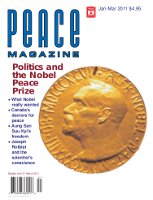
Peace Magazine Jan-Mar 2011, page 28. Some rights reserved.
Search for other articles by Shirley Farlinger here
By Linda McQuaig and Neil Brooks. (Viking Canada. 2010). 272pp.
The authors begin The Trouble with Billionaires by establishing just how gargantuan one billion really is. “If you are given one dollar every second it would take you almost 32 years to become a billionaire.” Or you could imagine a one-hour parade with peoples’ heights matching their incomes. From very tiny to slightly taller people for most of the parade it is only in the last few minutes that the really tall ones appear. The tallest Canadian is Michael Lazaridis with a take-home pay of $51 million standing 8,058 feet tall.
The book argues that the discrepancy is greater today than ever, even in pre-industrial times. When you compare the average pay of a 1970s CEO in with the average working wage, the gap was about 30 to 1. By 2006 it was 1,723 to 1. People have lost sight of the post-war, more just society.
Do the rich really deserve their wealth even if they are legally entitled to it? McQuaig and Brooks cite the example of Bill Gates, a philanthropist, a self-made man with no inherited wealth, a lucky innovator as producer of the system for the personal computer and a poster boy for billionaires.
But where did computers actually start? It all began with a patent in 1804 for a machine using punched cards to speed up the weaving of Jacquard brocaded fabrics. It certainly didn’t start with Bill Gates. His contribution was minor “compared with the collective contribution of so many others.”
So does the tax system collect a sufficiently large share of a person’s income to compensate for the enormity of the technological inheritance of today’s discoveries? “Tax avoidance by the rich is a massive industry.” This includes think-tanks, lobbyists, PR firms and lawmakers with an army of tax lawyers and accountants hired to reduce taxes. The illegal part, the authors contend, is the offshore bank accounts where money can be hidden. All this deprives our governments of billions of dollars and undermines democracy.
Outlined in the book is an analysis of the gift of $35 million from Peter Munk, founder of Barrick Gold, the world’s largest gold mining company. With tax savings the actual cost to Munk will be about $19 million. It is called the Munk School of Global Affairs at the University of Toronto. As it will cost the taxpayers at least $66 million, not counting the ongoing administration costs, it might better be called the “Canadian Taxpayers’ School of Global Affairs with Some Help from Peter Munk.” Munk can withdraw his support if he doesn’t like what takes place.
“The power of elites influences political decisions, probably even on climate change mitigation and nuclear abolition issues even when the public supports those,” Linda notes.
It has been a mistake, the book argues, to tackle poverty while ignoring inequality. The poor fare worst when inequality is most pronounced but people hesitate to criticize the rich. “We forget that between 1945 and 1980 capitalism was more vibrant and wealth more widely shared,“Linda says. “Now the middle class has lost ground and families require two incomes.”
We can all think of many programs our society needs to improve: social assistance, public education, affordable university fees and public housing. The answer involves making our tax system more progressive—that is, higher rates at the top. This is the first of the book’s six recommendations:
Reforms can contribute but are slow compared with what the tax system could do to reduce inequality quicker while leaving the market economy intact, the authors note.
Are we so star-struck by the opulence of the rich and famous that we hesitate to say out loud “You didn’t do this on your own, you owe society a debt and it’s time to repay it”?
Reviewed by Shirley Farlinger

Peace Magazine Jan-Mar 2011, page 28. Some rights reserved.
Search for other articles by Shirley Farlinger here